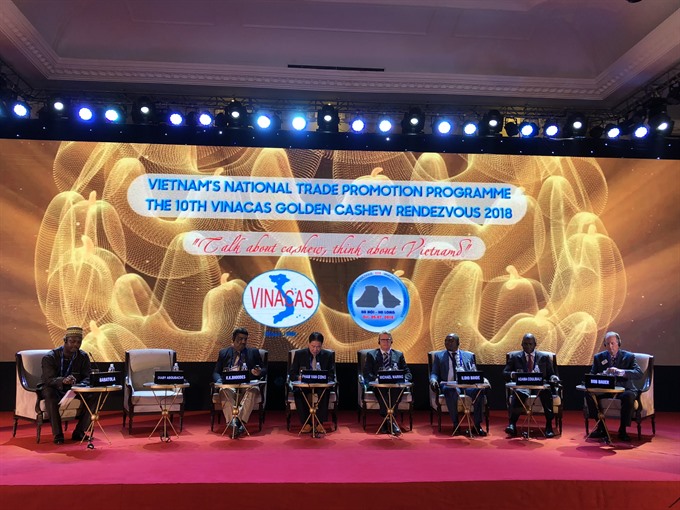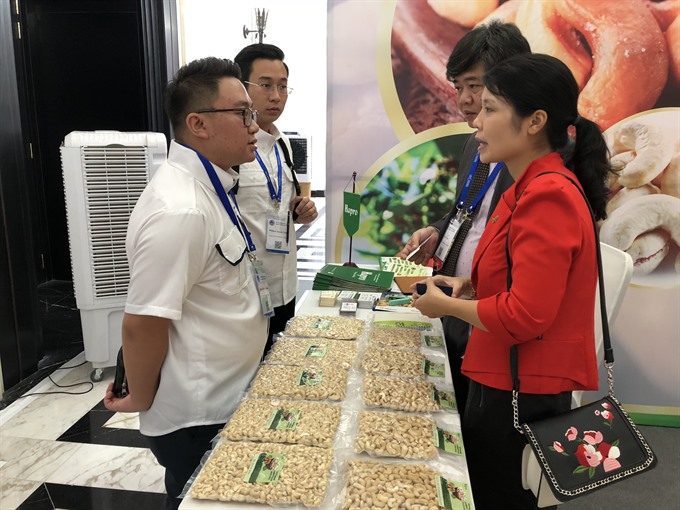Price stability is needed to ensure sustained growth of the cashew market and benefits for stakeholders in the cashew value chain, delegates said at the 10th International Conference on Cashew in Ha Long City over the weekend.

Price stability is needed to ensure sustained growth of the cashew market and benefits for stakeholders in the cashew value chain, participants said at the 10th International Conference on Cashew in Ha Long City over the weekend.
After a period of steady increase, global cashew prices have fallen sharply, causing difficulties for stakeholders in the sector, participants said.
Vu Thai Son, an executive member of the Viet Nam Cashew Association (Vinacas), the organiser of the event, said: “Last year cashew kernel prices soared to record levels, with WW320grade going to US$5.2 per pound fob. The prices have since fallen to $4.6-4.7 in early 2018, $3.65-3.7 in early September and $3.2-3.3 now.”
This has worried businesses, he said.
According to participants, the high prices last year caused consumers to switch to other nuts.
Wim Schipper, director for tree nuts and ingredients at Intersnack Procurement B.V, a subsidiary of Intersnack Group of Germany, said due to subsequent higher kernel prices, roasters had to increase their prices twice for sales in 2017 and 2018, resulting in “demand destruction” and a reduction in retail sales of the nut.
Cashew import into the EU saw steady growth from 2015 to 2017 and even in the first five months of this year, but reduced significantly from June, he said.
There is a strong connection between the steadiness of retail prices and retail sales of the nut, he said.
Retail sales in the EU are expected to fall by 10 per cent this year.
A representative of Red River Foods said cashew sales this year are expected to go down by 14 per cent.
“Demand should recover but it may take 9-15 months.”
Many participants asked speakers if prices have bottomed, but were told no one could be sure.
Wim said retailers usually sign long-term contracts for at least six months, usually a year. Due to this, there would be no extra demand for cashew kernels from retailers if prices decrease, he said.
But Son said there are some bright signs. “The number of orders at the current prices seems to have increased a lot, customers have started ordering at current prices for until June 2019. This proves that they think the price is reasonable for them, reasonable for consumers.”
In addition, some supermarkets in the US and EU have begun to cut shelf prices, which is very important signal because the prices are as cheap as the prices during a period when the consumption was very good, he said.
Consumption would possibly be good in the coming time, with consumers coming back to the nut, he said.
Wim said: “Sustainability and social compliance become more important. And price stability is needed to reduce exposure of all stakeholders and to grow the volume and to mature the business.”
With many importing countries paying greater concern to food safety, cashew processing and exporting firms must understand and comply with food safety regulations in their target markets, and have all documents required for possible inspections in importing countries, delegates said.

Key export item
Deputy Minister of Agriculture and Rural Development Le Quoc Doanh said the cashew industry has grown strongly in terms of both production and export, greatly contributing to the country’s economic growth and creating jobs.
Cashew is one of Viet Nam’s key export items, with the value reaching $3.62 billion last year, he said.
He urged the sector to focus more on improving value-addition, doing market research to boost exports and training human resources to ensure sustainable development.
Pham Van Cong, president of Vinacas, said Viet Nam accounts for more than 60 per cent of global cashew exports and has remained the top processor and exporter for the last 12 years.
Held since 2008, the annual conference is Viet Nam’s most important industry event, and seeks to promote its brands and exports and build and consolidate the relationship between Vietnamese and international cashew businesses, he said.
At the conference this year Vinacas, cashew processing and import companies and international cashew buyers, importers, distributors, processors, and marketers analysed, evaluated and oriented the development of the global cashew industry. — VNS





